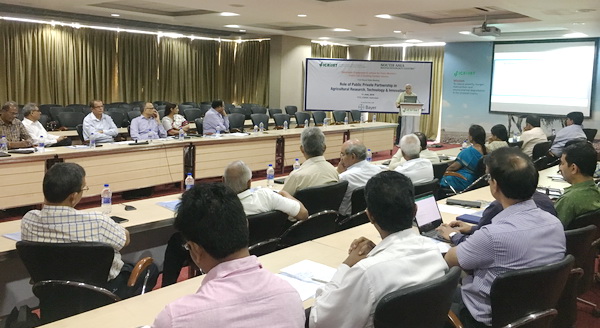
SABC & ICRISAT Discuss PPP in Agricultural Research, Technology, and Innovation in India
June 13, 2018| |
The South Asia Biotechnology Centre (SABC) in New Delhi and the International Crop Research Institute for Semi-Arid Tropics (ICRISAT) in Hyderabad work together to engage key stakeholders in a series of activities that aim to achieve the Prime Ministers' clarion call of doubling farmers' income. Around 45 key stakeholders, including farmers, farmers' organizations, ICAR institutions, SAUs, NGOs, industry associations, and private sector representatives participated in the round table meeting, "Role of Public Private Partnership in Agricultural Research, Technology and Innovation," supported by Bayer CropScience, on June 11, 2018 at ICRISAT, Patancheru, Telangana, India.
Recognizing that farmers' profitability and agricultural sustainability are the twin goals of the modern agricultural production system, Acting ICRISAT Director General Dr. Peter Carberry refers to the public-private partnership (PPP) as an important opportunity and asserts for PPP models for resourcing partnership during the inaugural session. Achieving these twin goals requires collaboration between public and private partners-ranging from companies to communities to improve input efficiency and crop productivity and act as a stimulant to growth resulting in improving the income of farmers in India.
Given the nascent stage of PPP in agriculture, the emphasis needs to be put on PPP for both upstream and downstream sides of agriculture value chain, said Dr. CD Mayee, SABC president. Increasing yield, improving small farmers' asset productivity and enhancing environmental sustainability amidst depleting natural resources, soil fertility, and climate change need a paradigm shift and a transformative approach in collaboration and partnership.
Indian industry representative Dr. Paresh Verma appeals to the Indian government to put in place a conducive policy framework and predictable regulatory environment for a strong PPP in agricultural research, technology and innovation, while Bayer's Rajvir Rathi emphasizes institutional over individual approval for a successful PPP in agriculture research, technology, and innovation. In conclusion, Dr. Sanjeev Jha, of ICAR proposes to develop an institutional mechanism and guidelines, and a clear national policy statement on PPP in agriculture for successful PPP at national and state level with an aim to foster attractive environment, spur collaborative R&D and extension and leverage investment, enhance private sector involvement in agriculture research and commercialization of technologies developed by public sector institutions.
For more information about PPP in agricultural research, technology, and innovation, visit the SABC website.
| |
Biotech Updates is a weekly newsletter of ISAAA, a not-for-profit organization. It is distributed for free to over 22,000 subscribers worldwide to inform them about the key developments in biosciences, especially in biotechnology. Your support will help us in our mission to feed the world with knowledge. You can help by donating as little as $10.
-
See more articles:
-
News from Around the World
- FAO Lists 20 Tools for Transforming Food and Agriculture to Achieve SDGs
- Kenya Starts Planting Biotech Cotton Under National Performance Trials
- USDA APHIS Seeks Comments to Deregulate GE Cotton
- Marketing Experts Study Why Consumers Don't See the Benefits of GM Foods
- SABC & ICRISAT Discuss PPP in Agricultural Research, Technology, and Innovation in India
- Plants Help Offspring by Passing on Seasonal Clues
- Speeding Up Photorespiration Boosts Crop Production by 47%
- Genetically Engineered Rice Transports Micronutrients More Efficiently
-
Research Highlights
- PvTRX1h Gene Involved in Regulation of Nodules in Common Bean
- TaPSTOL Controls Agronomically Important Traits in Wheat
-
Beyond Crop Biotech
- Kenyan Stakeholders Advocate Harnessing Innovations in Biotech to Curb Plastic Pollution
- AU Launches Report on Emerging Technologies Expected to Spur Africa Development
-
Announcements
- 3rd World Biotechnology Congress
-
Resources
- Bt Eggplant Videos
-
Plant
- Use of Tomato Promoter Increases CRISPR-Cas9 Efficiency
- OsSLA4 Plays a Role in Chloroplast Development in Rice
- CRISPR Confirms Candidate Gene for Flag Leaf Size in Rice
- Researchers Find Potential Fusarium Wilt Resistance Gene in Tomato
-
Read the latest: - Biotech Updates (January 14, 2026)
- Gene Editing Supplement (December 17, 2025)
- Gene Drive Supplement (February 22, 2023)
-
Subscribe to BU: - Share
- Tweet

